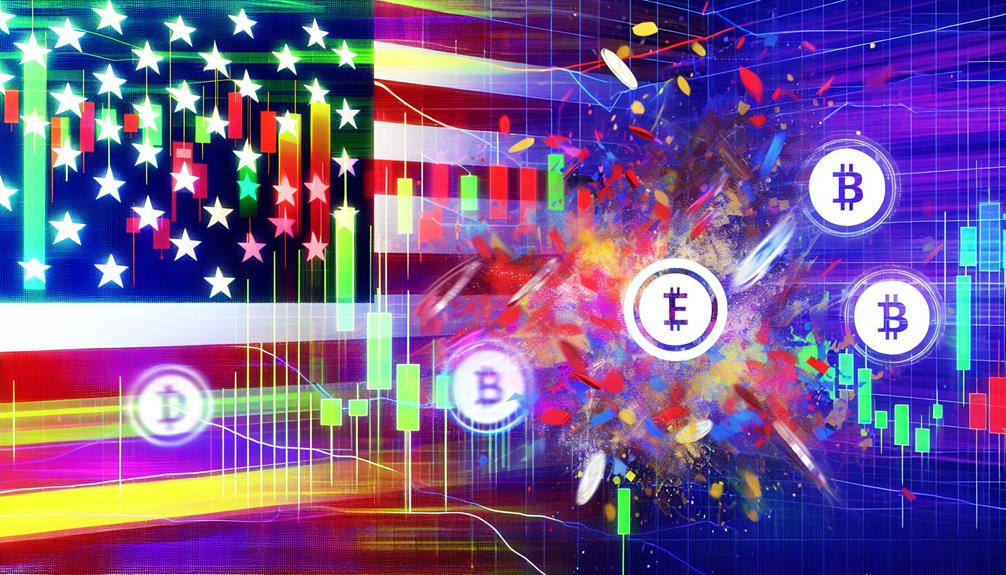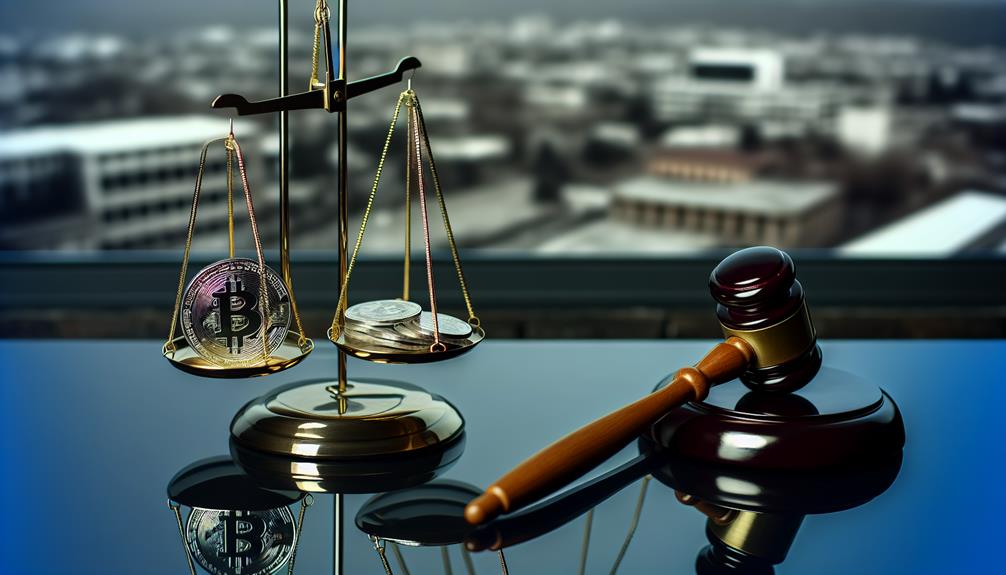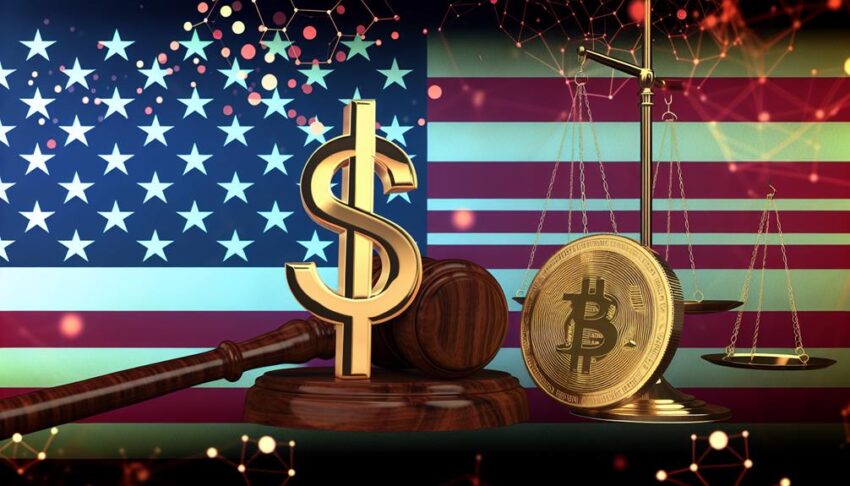Like the mythical Pandora's box, the world of decentralized finance presents both opportunity and uncertainty. You might be wondering if using Uniswap in the U.S. is a legal gray area or if it's entirely permissible. While there aren't specific laws against using platforms like it, the regulatory landscape is anything but straightforward. As potential legal risks and evolving regulations loom, understanding the implications becomes essential. What does this mean for your participation in the DeFi space?
Overview of Uniswap

Uniswap is a decentralized exchange protocol built on the Ethereum blockchain, allowing users to trade cryptocurrencies directly without intermediaries. This innovative platform operates through smart contracts, enabling you to swap various ERC-20 tokens seamlessly. The core of Uniswap's functionality lies in its automated market-making (AMM) model, which replaces traditional order books with liquidity pools. In these pools, users provide liquidity by depositing pairs of tokens, earning a share of the trading fees generated by the platform.
As a DeFi investment option, Uniswap offers unique advantages. First, it democratizes access to trading, allowing anyone with an Ethereum wallet to participate without the need for a centralized authority. This feature fosters financial inclusion, especially for those in regions with limited banking services. Additionally, Uniswap's governance token, UNI, allows users to participate in decision-making processes, enhancing community engagement and ownership.
However, while Uniswap's benefits are significant, there are risks associated with its use. You must be aware of impermanent loss when providing liquidity, which can affect your returns. Furthermore, the lack of regulatory oversight raises questions about security and compliance, making it crucial to conduct thorough research before engaging with the platform.
Current U.S. Cryptocurrency Regulations
Traversing the landscape of cryptocurrency regulations in the U.S. can be complex and often confusing. These regulations vary considerably depending on the state and the nature of the cryptocurrency in question. The primary regulatory frameworks governing cryptocurrency exchanges, including decentralized platforms like Uniswap, are established by agencies like the Securities and Exchange Commission (SEC) and the Commodity Futures Trading Commission (CFTC).
You'll find that the SEC focuses on whether a cryptocurrency should be classified as a security, which can influence how you engage with various exchanges. If a token is deemed a security, it must comply with specific regulations, including registration and disclosure requirements. On the other hand, the CFTC looks at cryptocurrencies as commodities, which introduces a different set of compliance rules.
At the state level, regulations can also differ. Some states may impose additional requirements on cryptocurrency exchanges, demanding licenses or registration. This patchwork of regulations means that what's permissible in one state might be restricted in another, making it vital for you to stay informed about your local laws.
Moreover, the introduction of recent legislation aims to create a more unified regulatory approach, yet the process is ongoing. As a user of platforms like Uniswap, understanding these regulatory frameworks can help you navigate potential legal implications and guarantee your activities remain compliant. In this evolving environment, staying updated on these regulations is important for anyone involved in cryptocurrency trading.
Legal Risks of Using Uniswap

When engaging with decentralized exchanges like Uniswap, you should be aware of the legal risks that may arise from your transactions. The evolving regulatory landscape in the U.S. creates a complex environment for users. While Uniswap operates on a decentralized protocol, this doesn't exempt you from potential legal implications associated with your trading activities.
One significant risk lies in the classification of cryptocurrencies. The U.S. Securities and Exchange Commission (SEC) has taken a firm stance on determining whether certain tokens qualify as securities. If you trade a token deemed a security without proper registration or compliance, you could face penalties. In addition, engaging in trading activities that violate anti-money laundering (AML) or know your customer (KYC) regulations can put you at risk of legal action, even if the platform itself facilitates anonymous transactions.
Conducting a thorough risk assessment before using Uniswap is vital. This means not only understanding the tokens you're trading but also keeping abreast of any regulatory changes that may impact the legality of your actions. Additionally, the decentralized nature of Uniswap could complicate legal recourse should disputes arise.
Ultimately, while Uniswap offers unique opportunities, it is important to navigate the associated legal risks carefully. By staying informed and conducting diligent risk assessments, you can mitigate potential legal issues and make more informed decisions in your trading activities.
Compliance Best Practices
Maneuvering the complexities of compliance is fundamental for anyone looking to use decentralized exchanges like Uniswap. To guarantee you're operating within the legal boundaries, it's imperative to adopt effective compliance best practices tailored to your specific situation. Start by familiarizing yourself with existing compliance frameworks that govern cryptocurrency transactions in your jurisdiction. This knowledge will help you identify the regulations you need to follow.
Conducting a thorough risk assessment is another essential step. By evaluating the potential risks associated with your trading activities, you can better understand your exposure to legal and financial repercussions. This assessment should include an analysis of the types of tokens you plan to trade, the nature of your transactions, and the parties involved.
It's also wise to keep abreast of any changes in regulatory landscapes. Laws governing cryptocurrencies are evolving rapidly, so staying informed will allow you to adapt your strategies and maintain compliance. Additionally, consider implementing robust record-keeping practices. Documenting your transactions and communications can provide critical evidence that you've acted in good faith if any legal questions arise.
Lastly, engage with legal professionals who specialize in cryptocurrency regulations. Their expertise can guide you through the intricacies of compliance and help you navigate potential pitfalls. By taking these proactive measures, you'll position yourself to use Uniswap more securely and responsibly, minimizing the risk of legal repercussions while maximizing your trading opportunities.
Future of DeFi Regulations in the U.S

As the landscape of decentralized finance (DeFi) evolves, you might wonder how future regulations in the U.S. will shape the way platforms like Uniswap operate. The rapid growth of DeFi has outpaced traditional regulatory frameworks, leading to significant regulatory uncertainty. This uncertainty could influence the development of decentralized governance models that aim to balance innovation with compliance.
To give you a clearer picture, here's a table outlining potential regulatory scenarios:
| Scenario | Impact on DeFi Platforms | Role of Decentralized Governance |
|---|---|---|
| Strict Regulations | Increased compliance costs | Limited flexibility in operations |
| Moderate Regulations | Balanced innovation and compliance | Greater adaptability to changes |
| No Regulation | Unfettered growth | Risks of misuse and fraud |
| Regulatory Clarity | Encouraged institutional investment | Enhanced legitimacy |
| Evolving Regulations | Constant adaptation | Necessity for community involvement |
The future of DeFi regulations in the U.S. will likely hinge on how regulators choose to approach these platforms. A framework that recognizes the unique characteristics of DeFi while ensuring consumer protection could foster a healthy ecosystem. Conversely, overly restrictive measures might stifle innovation, pushing users towards unregulated alternatives.
Ultimately, you'll need to stay informed about the evolving regulatory landscape, as it'll directly impact your engagement with platforms like Uniswap. Embracing decentralized governance could empower communities to navigate these challenges effectively.
Frequently Asked Questions
Can I Use Uniswap Anonymously in the U.S.?
You can use Uniswap anonymously, but privacy concerns arise since transactions are recorded on the blockchain. Decentralized exchanges offer more privacy than centralized platforms, yet complete anonymity isn't guaranteed due to potential regulatory scrutiny.
What Are the Tax Implications of Using Uniswap?
When using Uniswap, you're subject to capital gains tax on profits. It's essential you keep accurate records for tax reporting, as failure to report could lead to penalties or audits from tax authorities.
Is Uniswap Available in All U.S. States?
Imagine charting a vast map; Uniswap's accessibility varies across states. Some have strict regulations, while others embrace it. Always check your state's regulations to guarantee you're sailing smoothly through the crypto waters without legal storms.
Can I Get Fined for Using Uniswap?
You might face legal consequences for using Uniswap if it violates regulatory compliance. It's essential to stay informed about local laws and regulations to avoid any potential penalties related to decentralized finance platforms like Uniswap.
Are There Age Restrictions for Using Uniswap?
Uniswap doesn't implement age verification directly, but it's essential you're of legal age to consent to transactions. Without proper user consent, legal issues may arise, so always guarantee you meet age requirements before engaging.
Conclusion
In the intricate dance of decentralized finance, using Uniswap in the U.S. isn't illegal, but it's a tightrope walk. As regulations evolve, staying informed is your safety net against potential legal pitfalls. Just as a ship needs a compass to navigate stormy seas, you must understand the regulatory landscape to steer clear of trouble. Embrace the opportunities DeFi offers, but tread wisely; the winds of change could shift at any moment.
